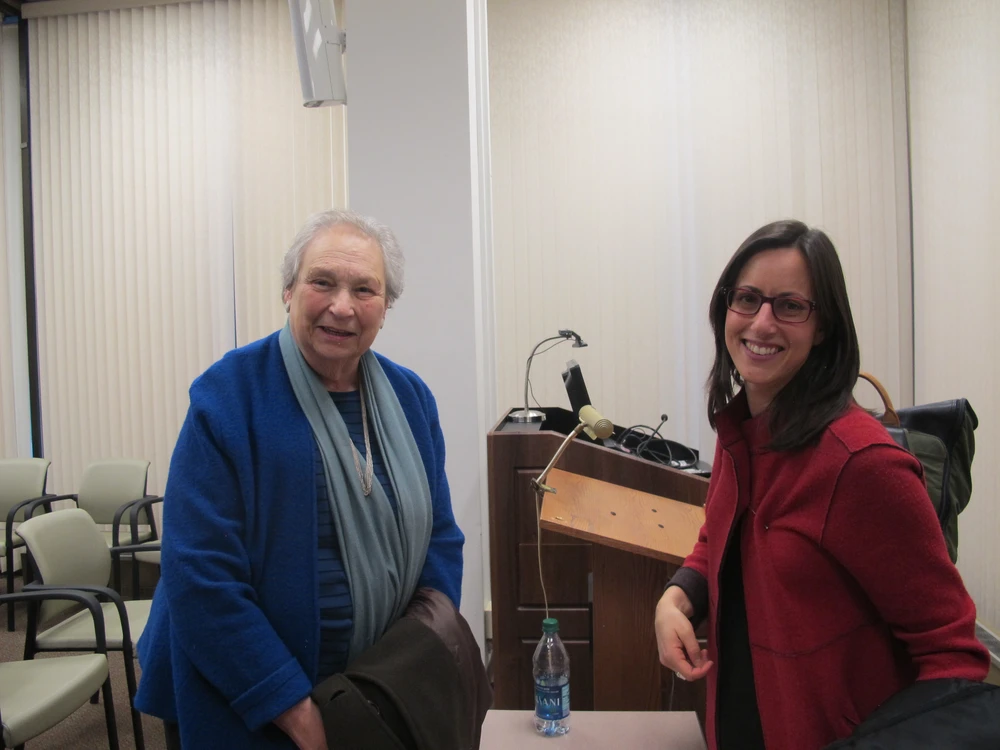
We were delighted that Julia Phillips Cohen was the 2018 Einhorn lecturer and joined us for two events on the University of Illinois, Urbana-Champaign campus on Monday, April 9. A packed to capacity noon workshop entitled “The Past as Foreign Country: Sephardi Jews and the Spanish Past” and then a standing room only 5pm lecture entitled “Jews for Jihad? Jewish Citizens in an Islamic Empire.” Cohen is the author of Becoming Ottomans: Sephardi Jews and Imperial Citizenship in the Modern Era (Oxford University Press, 2014), which was awarded multiple prizes. Together with Sarah Abrevaya Stein, Cohen is also co-editor of Sephardi Lives: A Documentary History, 1700-1950 (Stanford University Press, 2014). We are very grateful to the Einhorn family for this lecture series which has always brought stellar scholars to our campus.
Professor Bruce Rosenstock (Religion), offered a beautiful introduction before the evening talk, and writes this about Julia Cohen’s visit:
This year, Julia Cohen, Associate Professor of History and Jewish Studies at Vanderbilt, was the Einhorn Visiting Lecturer. On Monday, April 9, 2018, Prof. Cohen offered a lunchtime colloquium and the Einhorn lecture later that afternoon. Her colloquium previewed an article that encapsulates the argument of her new book. Her new book will examine the ways that Sephardi Jews pictured Spain from the time of the expulsion in 1492 until the present. Prof. Cohen's article argued that for most of the time that Sephardi Jews lived in the Ottoman Empire, they did not long to return to Spain nor did they imagine their expulsion to be a terrible trauma that disrupted their lives. Rather, they sought to integrate into their newfound home, the Ottoman Empire. Spain simply lacked any central place in their lives, and many Sephardi Jews were not even aware that they were speaking a dialect of Spanish. The late nineteenth century changed things when efforts were made by the French outreach organization, Alliance Israelite Universelle, to bring greater awareness of European ideas to the Sephardi Jews of the Ottoman Empire. Then it became a matter of pride that Sephardi Jews preserved folklore from pre-1492 Spain and maintained a dialect of Spanish from Spain's Golden Age. In her Einhorn lecture, "Jews for Jihad?: Sephardi Jews in an Islamic State," Prof. Cohen further explored the ways that Sephardi Jews sought to integrate as upstanding and loyal citizens of the Ottoman Empire in the nineteenth century. Much like American Jews of the twentieth century, Sephardi Jews embraced their home country because it offered them equal opportunity with other minorities for schooling and participation in the political affairs of the state. Prof. Cohen discussed the problems that these new opportunities also brought, especially in relation to other minorities who lived in countries like Greece and Bulgaria that had been conquered by the Ottomans. Sephardi Jews did not have an allegiance to a formerly independent nation and therefore they were held up us as a "model millet" or "model minority," thus instigating the resentment of other minorities. In the late nineteenth century, however, Zionism drew some Sephardi Jews into tense relations with the state, especially after 1918 when Palestine no longer was a part of the Turkish state. In both her afternoon colloquium and evening lecture, Prof. Cohen offered us new perspectives and new insights into the rich and little-known story of the Sephardic Jewish integration into the Ottoman state.